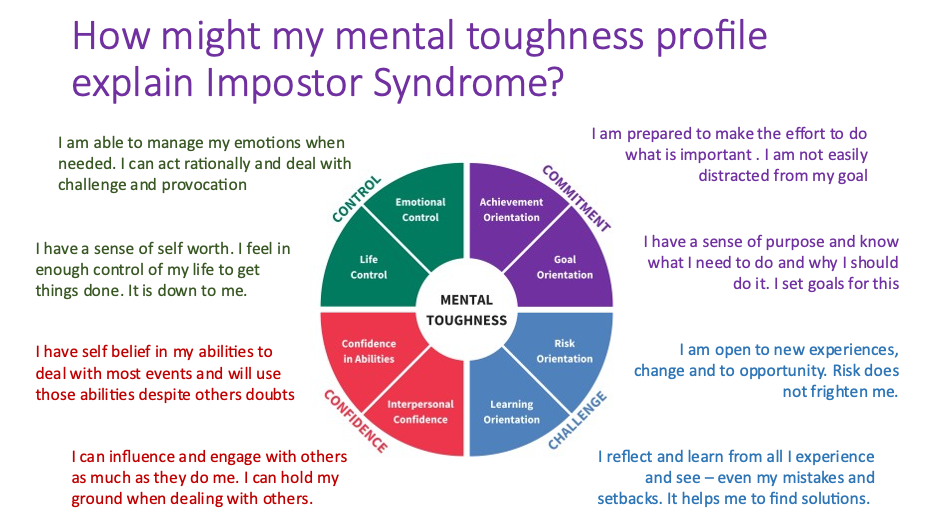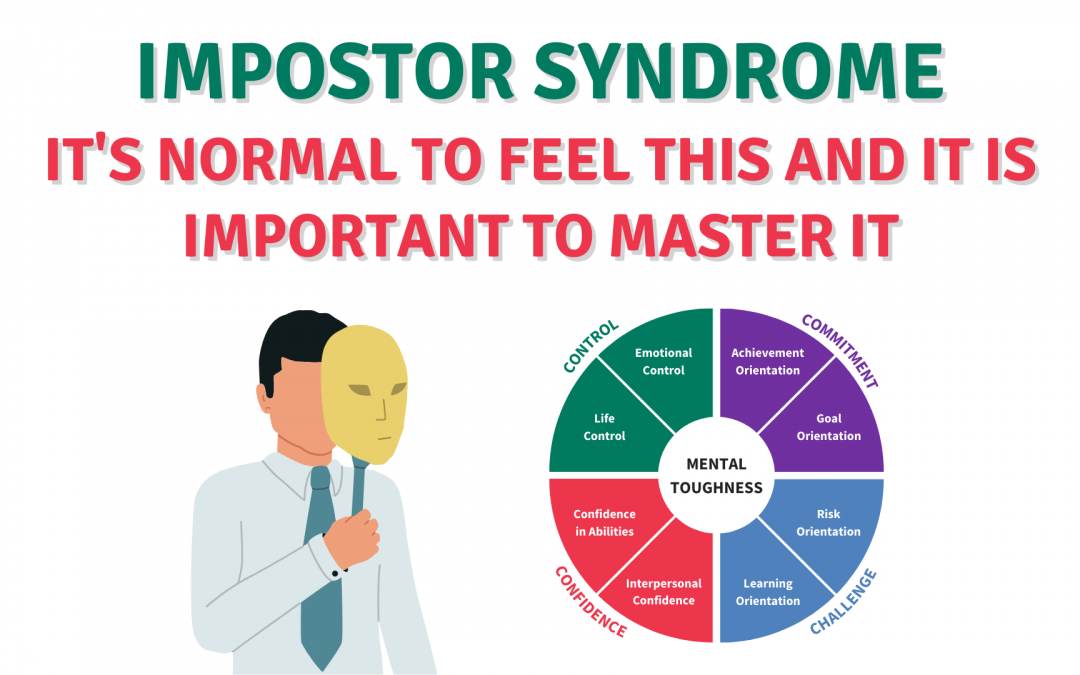Impostor syndrome describes how normally high-achieving individuals who, although successful, have persistent self-doubt and a fear of being exposed as a fraud or impostor.
Those with impostor syndrome can struggle with attributing their success to their abilities and their own self-worth. They can attribute their successes to factors which are often external to them or even luck*. In turn, this can lead to feelings of depression and anxiety.
Those exhibiting impostor syndrome can be adept at:
- Failing to recognise the skills and abilities they possess.
- Beating themselves up for not achieving very demanding goals.
- Inability to deal with anxiety, stressors and pressures.
- Self-doubt about themselves as worthwhile individuals.
- Believing that it was others who rose to the challenge and carried them with them.
Initially identified in high-achieving females by Pauline Clance and Suzane Imes, we now know that it is equally prevalent in males. Studies suggest that up to 70-80% of people experience it at some stage.
At one level, this is just a normal response – not an exceptional one. Clance and Imes never called it a syndrome, they wrote about the Impostor Phenomenon! A syndrome is abnormal. A phenomenon is just something we observe. This has likely been overhyped.
This can just be a normal aspect of reflection – “Was that achievement really down to me or did it have little to do with me and I should not be taking the credit?”. It can even be useful to put one’s achievements into perspective. The opposite could be to take all the credit for something to which you have contributed.
For some, what we call impostor syndrome, can even provide a source of motivation to succeed. Cattell, the developer of the 16pf measure, found that anxiety was a factor in performance. Some would work harder and longer to shake off the feeling of anxiety.
Often described as a behavioural health condition, it is much more the result of the way an individual approaches tasks and challenges in their mind. It is a mental response.
As such, the 8 factors in the mental toughness concept provide a lens through which we can understand impostor syndrome in ourselves and our colleagues and clients. Importantly, the factors which create impostor syndrome are likely to be different for each of us.
Important because the tendency to offer “one size fits all” solutions (“5 tips to …..”) can be counterproductive if the solution isn’t customised to the individual. Both from the individual’s perspective in creating self-awareness about their mental response and therefore what they should look for in a solution as well as the solution provider understanding the individual and being able to tailor their proposition to the need.
The 4Cs mental toughness concept is very well evidenced both through significant peer-reviewed research as well as in practice. The concept recognises that there are 8 independent factors which contribute to an individual’s level of mental toughness.
It is important at this point to recognise that most people have what is called a “spikey” profile. They will be more mentally tough on some factors and less so (described as mentally sensitive) on other factors. Each factor or a combination of factors can explain why an individual might think they are an ”impostor”.
The figure below illustrates briefly what a reasonable degree of mental toughness on each factor might mean. A much fuller explanation can be found in “Developing Mental Toughness” (3rd Ed. Kogan Page 2021). Strycharczyk, Clough and Perry.

Impostor syndrome can arise from a degree of mental sensitivity on each factor. That is, the outcome is the opposite of what we see described above.
In looking at the Control element, a low level of Life Control can mean that there is a low sense of self-worth. Despite doing a good job, you can easily attribute this to factors that have little to do with you.
Similarly with Emotional Control, although we can often be nervous or anxious about many aspects of what we do, here the individual will not manage this and will allow anxiety, nervousness and depression to dominate their belief about themselves.
With Commitment, the individual might struggle to make an effort or be easily distracted and take the view that they don’t make a sufficient contribution to the task. If lacking a sense of purpose, they might believe that they are not sure they know why they are doing things and are carried by the purposefulness of others.
Challenge and Confidence are elements which bring optimism, hope and positivity to your approach. Even when doing something bold and exploring new opportunities, you may feel that it is not you who is driving this, but you are, again, being swept along by others.
When setbacks occur, you might not feel sufficiently reflective to explore why that has happened and are likely to repeat those mistakes. It is others who work this out although you may be part of the process that does work it out.
Finally, Confidence in Abilities – whether these are your skills and knowledge or your ability to engage with others, this can mean that you don’t believe that you are as able as you are and you are not as influential or engaging as you are.
This illustrates two things:
Firstly, this phenomenon is not one thing. It’s a nuanced notion and the sense of being an impostor can have many roots. It may be down to one of these factors or a combination of several factors.
Secondly, the mental toughness framework provides a lens through which we can begin to understand this. Critical for directing the correct development activity to the right factor(s).
More than usefully, there is now a high-quality psychometric measure, the MTQPlus, which helps users understand their mental toughness profile with a high degree of reliability.
So, you think you are an impostor? You are just like the rest of us. Thinking you are an impostor is not fatal.
When understood, there are solutions which can be very effective. Mental Toughness brings that potential for a solution to the problem.
For information about becoming a licensed user of the MTQ suite of measures (available in 14 languages) contact: headoffice@aqrinternational.co.uk
Completion of the AQR Licensed user training programme is recognised by EMCC and ICF for CPD purposes.



